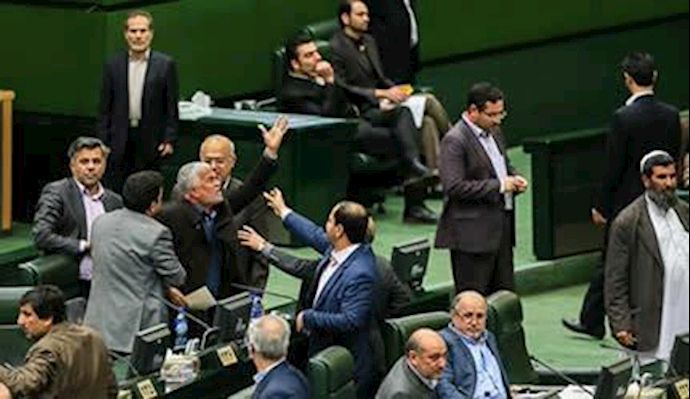
The infighting between various members of the regime’s parliament, a daily scene during Majlis sessions.
The prospect of negotiations with the United States has generated controversy, infighting, and confusion among regime factions. Supreme Leader Ali Khamenei and his faction refuse to consider talks with the U.S., while regime President Hassan Rouhani expressed willingness to meet with U.S. officials until two weeks ago when he did an abrupt and unexplained about-face.
Talk or no talk, the mullahs' ruling #Iran are facing an escalating crisis.
And time is not on their side.https://t.co/ydAXdtfL9d— People's Mojahedin Organization of Iran (PMOI/MEK) (@Mojahedineng) June 8, 2019
Recent comments by members of different regime factions illustrate the chaos in Tehran.
Negotiation Equals Surrender
In recent comments, Ahmad Khatami, a high-ranking mullah from Khamenei’s faction, explained his faction’s reasoning for not negotiating with the U.S.:
“The important issue is combating and hating [the U.S.]. The reason is clear: The triangle of [U.S. President] Trump, [Secretary of State] Pompeo and [National Security Advisor] Bolton continuously talk these days about negotiating with the U.S. as if they intend to bring the state to the negotiating table with the [U.S.] as soon as possible. What the [U.S.] suggests today under the pretext of negotiations, is nothing more than surrender,” he said.
“There is only one voice coming from Iran and that voice says we will not negotiate about our missile power… Therefore we won’t negotiate!” Khatami added.
Negotiation Equals Ignoring Domestic Potential
Fuad Izadi, a political pundit aligned with Khamenei’s faction, argued that attempts by Rouhani’s faction to negotiate with the U.S. come at the expense of Iran’s domestic potential.
During the end-2017 uprising across Iran, It was ordinary Iranians who famously introduced on of the most popular chants in Iran's current popular sphere: "Conservatives, Moderates! The game is over!"#Iran#IranRegimeChangehttps://t.co/aciCewP0FR
— People's Mojahedin Organization of Iran (PMOI/MEK) (@Mojahedineng) February 2, 2019
“Our problem is with our own domestic, West-aligned figures who look to the West,” he said. “This look to the inside and the domestic potentials are ignored. How many years has the country been waiting for the Americans to do this or that? To remove this or that sanction? Or Europe to do this or that, and we are still in the middle of it?” he added.
Negotiations with Japan Will Decrease Tensions
Abbas Araghchi, First Deputy to the regime’s Foreign Minister Mohammad Javad Zarif, had a different point-of-view. He expressed optimism about Japanese Prime Minister Shinzo Abe’s planned visit to Tehran next week, saying, “Japan will probably be able to make the Americans understand the current circumstances.”
“We hope that Abe’s visit to Tehran will help decrease regional tensions,” Araghchi added.
Negotiations with other Countries Will Not Decrease Tensions
Fereydoun Majlesi, a retired Iranian diplomat close to Rouhani’s faction, expressed the opposite view, saying:
“It would be far from the truth if we thought that the diplomatic mediation campaigns launched by various countries would lead to a dramatic decrease in tensions. These tensions have reached a critical and sensitive point on both sides.. There is no doubt that in order to decrease tensions of such levels of confrontation, we need a complex, detailed and of course, long lasting process. Therefore, you can’t do serious work in the short-term to decrease tensions,” he explained.
“When Tehran and Washington are in an ideological and strategic tension against each other, and tensions have reached a point where Iran’s victory practically means America’s defeat, and America’s victory means Iran’s defeat, it appears that tensions have reached a point where mediation is not possible,” he added.
Senior U.S. officials are holding the regime in #Iran and the Revolutionary Guards responsible for the attacks on four commercial ships off the UAE coast.#Terrorismhttps://t.co/q0V38nZBB5
— People's Mojahedin Organization of Iran (PMOI/MEK) (@Mojahedineng) June 6, 2019
The MEK has stated repeatedly that the mullahs are incapable of reform. Their position on various issues, like essential freedoms, repression of dissents at home, meddling in the region and support for terrorism, development of WMD weapons are the same, and their infighting is to have more share of the power. The controversy within the regime proves this. The only way to change Iran is through regime change.
Staff writer
